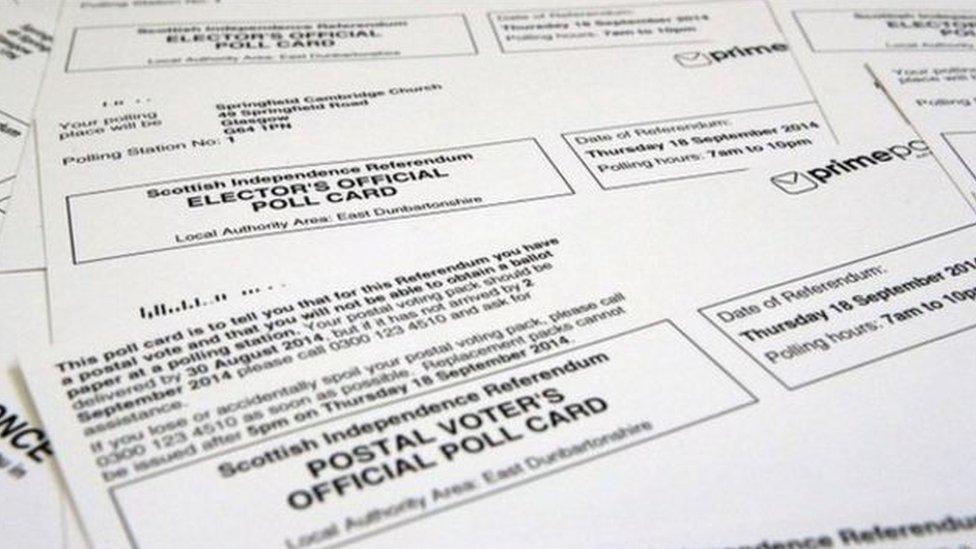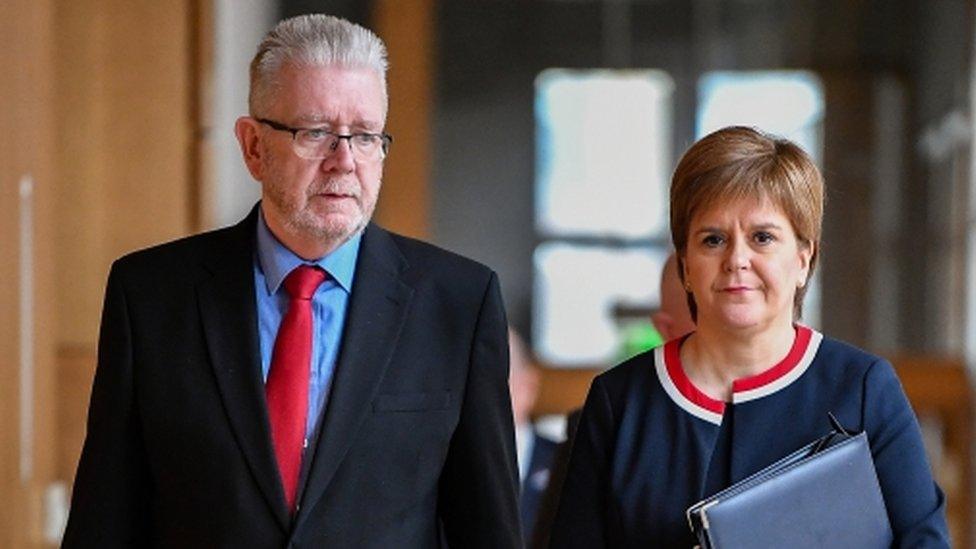MSPs urge agreement over indyref2 question testing
- Published

Scottish ministers have been urged to strike a deal with the Electoral Commission over testing the question for a future independence referendum.
Holyrood's constitution committee has been examining the Referendums Bill, which could pave the way for a vote.
The Scottish government says the yes or no question used in 2014 does not need to be tested again by the watchdog.
But the committee unanimously said ministers "must recognise the weight of evidence in favour" of a fresh test.
They want the government to "come to an agreement" with the Electoral Commission before the bill reaches the second stage of parliamentary consideration.
The Scottish government wants to hold a new independence referendum in the second half of 2020, and has put forward the Referendums (Scotland) Bill to set the framework for this.
First Minister Nicola Sturgeon has said the bill should be in law "by the new year", but it now faces being amended in light of the cross-party committee's concerns.

The Scottish government says the 2014 referendum provides "clear precedent" for a question
The 2014 referendum was run on the question "should Scotland be an independent country", with the available answers "yes" and "no".
The Scottish government wants to stick with this question for a second poll, but some unionist campaigners have argued that the "leave" or "remain" approach of the 2016 EU referendum should be used instead.
'Rig the process'
The Electoral Commission would usually be brought in to test the fairness of any question put to the public, but the Referendums Bill as it stands says they would not need to be consulted over a question that has been used before.
Constitutional Relations Secretary Mike Russell told the committee that the 2014 question was still in "current use" in many opinion polls, and said it could "create confusion" to test it again.
He said he was "against retesting in circumstances that do not require that", while Ms Sturgeon has claimed opposition parties are seeking to "rig the entire process".
The Commission told the committee that they "firmly recommend" they be consulted, "regardless of whether we have previously published our views on the proposed wording", and were backed in this by a series of other witnesses, including scholars and the Law Society of Scotland.
In their final report, the committee unanimously recommended that Mr Russell "recognises the weight of evidence in favour of the Electoral Commission testing a previously used referendum question, and must come to an agreement based on this evidence with the Commission prior to stage two".

Mike Russell and Nicola Sturgeon have both argued against re-testing the referendum question
Members also want changes to strip back the powers of ministers to call referendums and set the conditions for them.
The bill as it stands would create a general structure for a contest so ministers can set the date, question and campaign period for any referendum without passing a new bill.
The committee recommended this be changed so that new primary legislation was required for any referendum on a constitutional issue.
'Alternative approaches'
They also said the margin of victory in any poll should be a simple majority.
A petition had been lodged with the parliament calling for a two-thirds majority to be required for victory in a new independence ballot, but this was rejected by the committee and has also been dismissed by the Scottish Conservatives.
Committee convener Bruce Crawford said the group "supports the policy objective of the bill - to put in place a generic framework for referendums - on the basis that the bill is amended to reflect the weight of evidence we received".
He added: "We welcome the approach taken by the cabinet secretary in his oral evidence to our committee where he indicated that he is 'open to alternative approaches to all aspects of the bill' and how it can be improved.
"Our recommendations are intentionally framed to inform an open discussion on how the bill can be improved based on the substantial evidence received."
- Published26 September 2019
- Published19 August 2019

- Published26 June 2019
